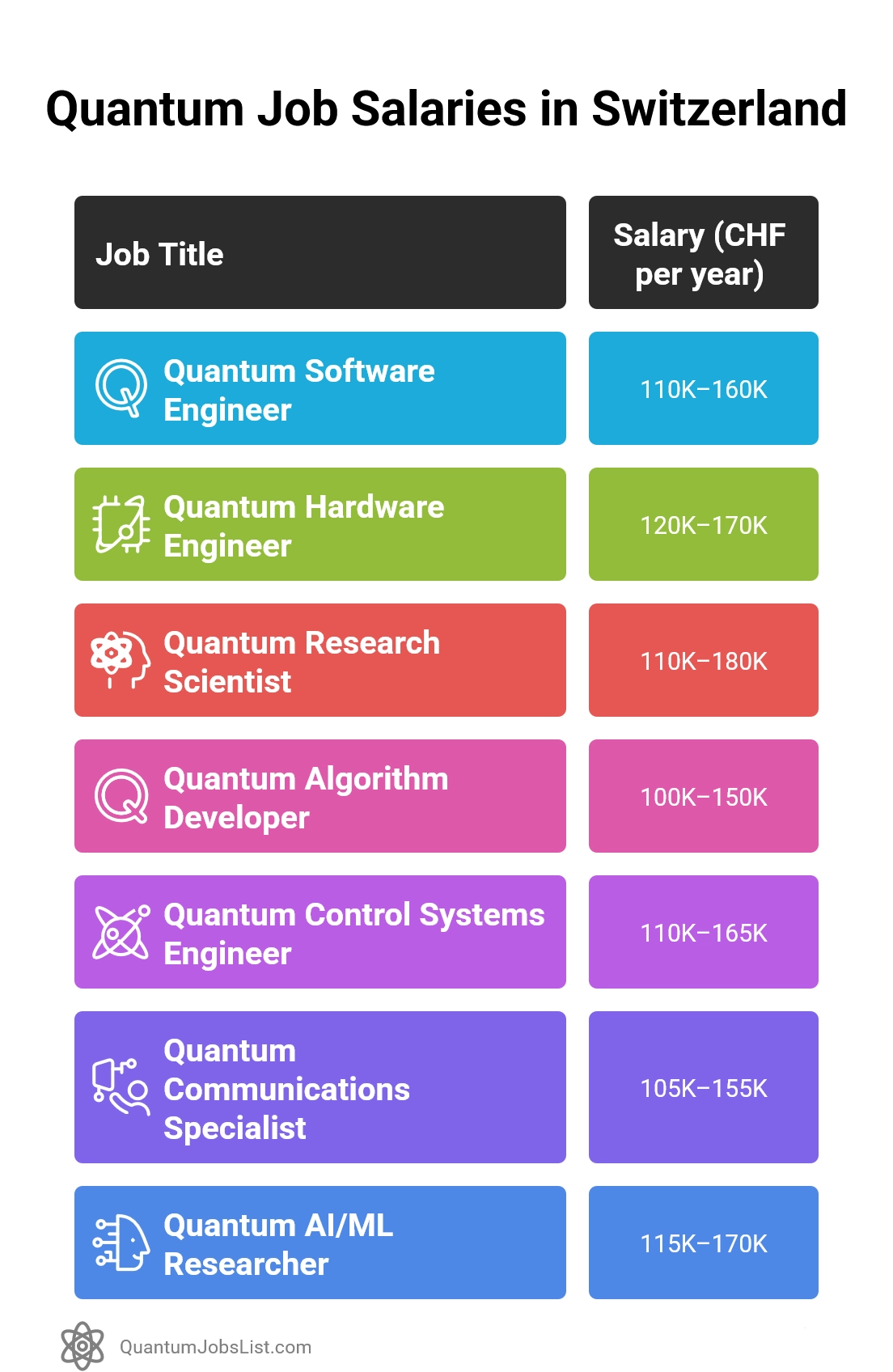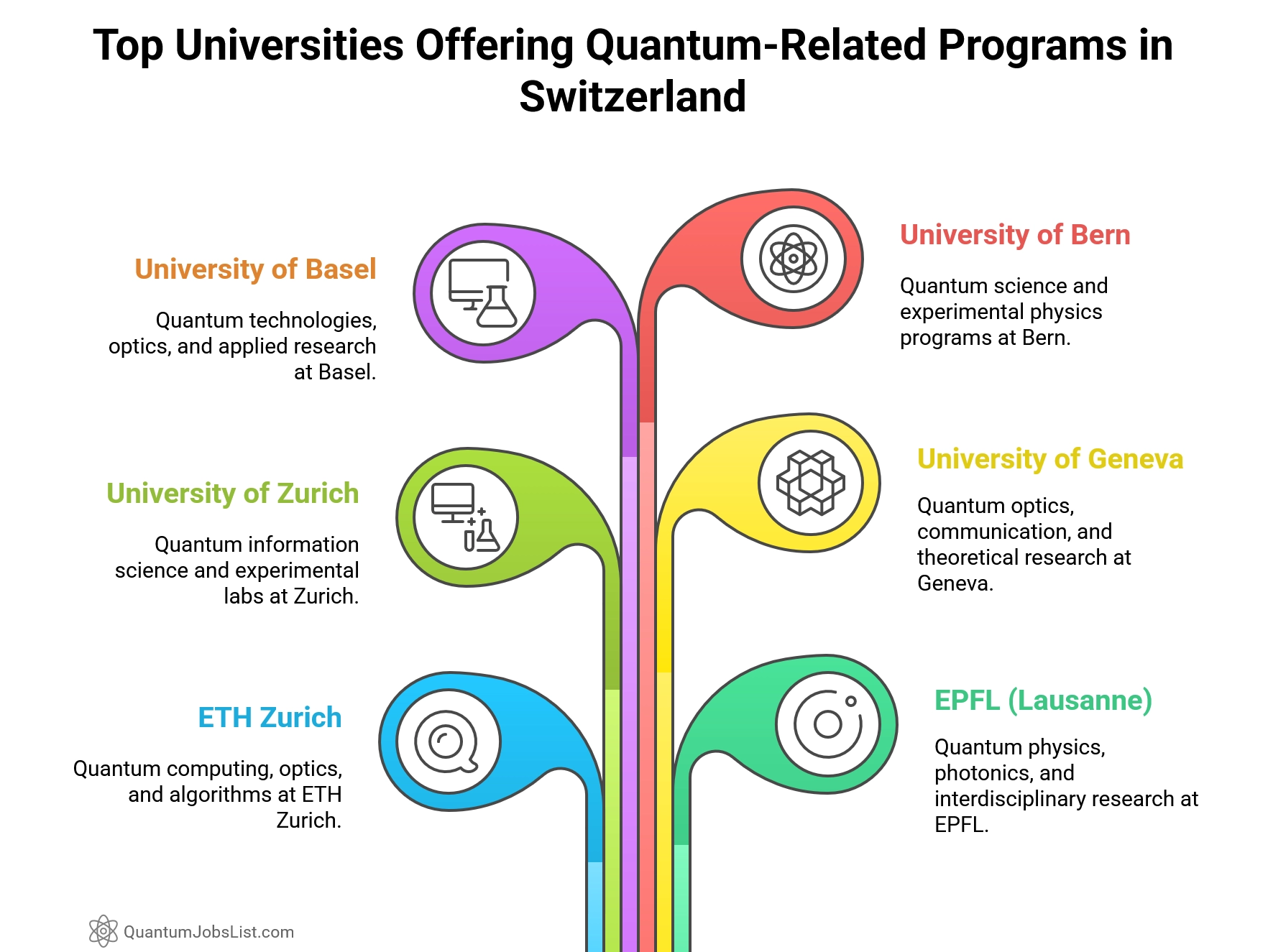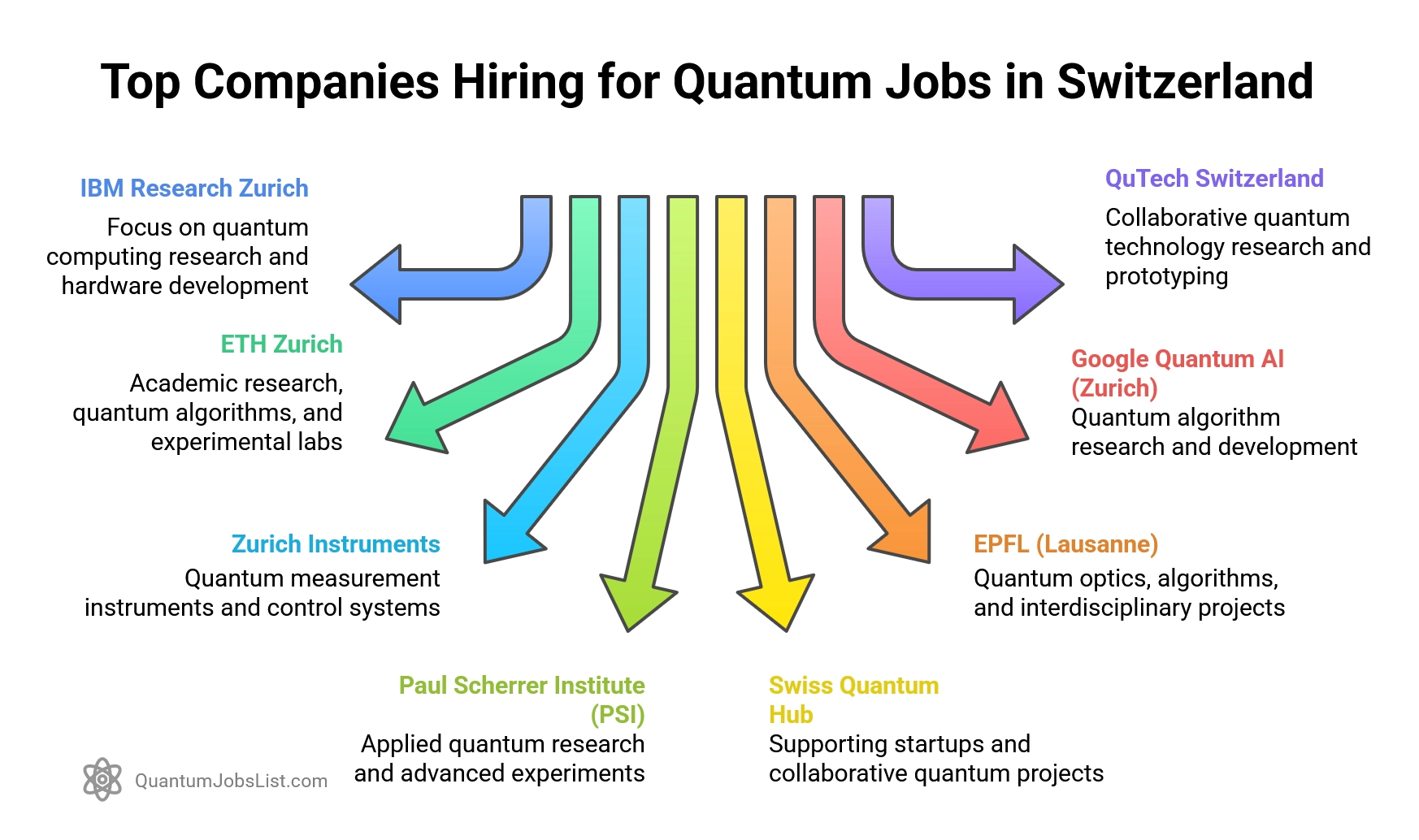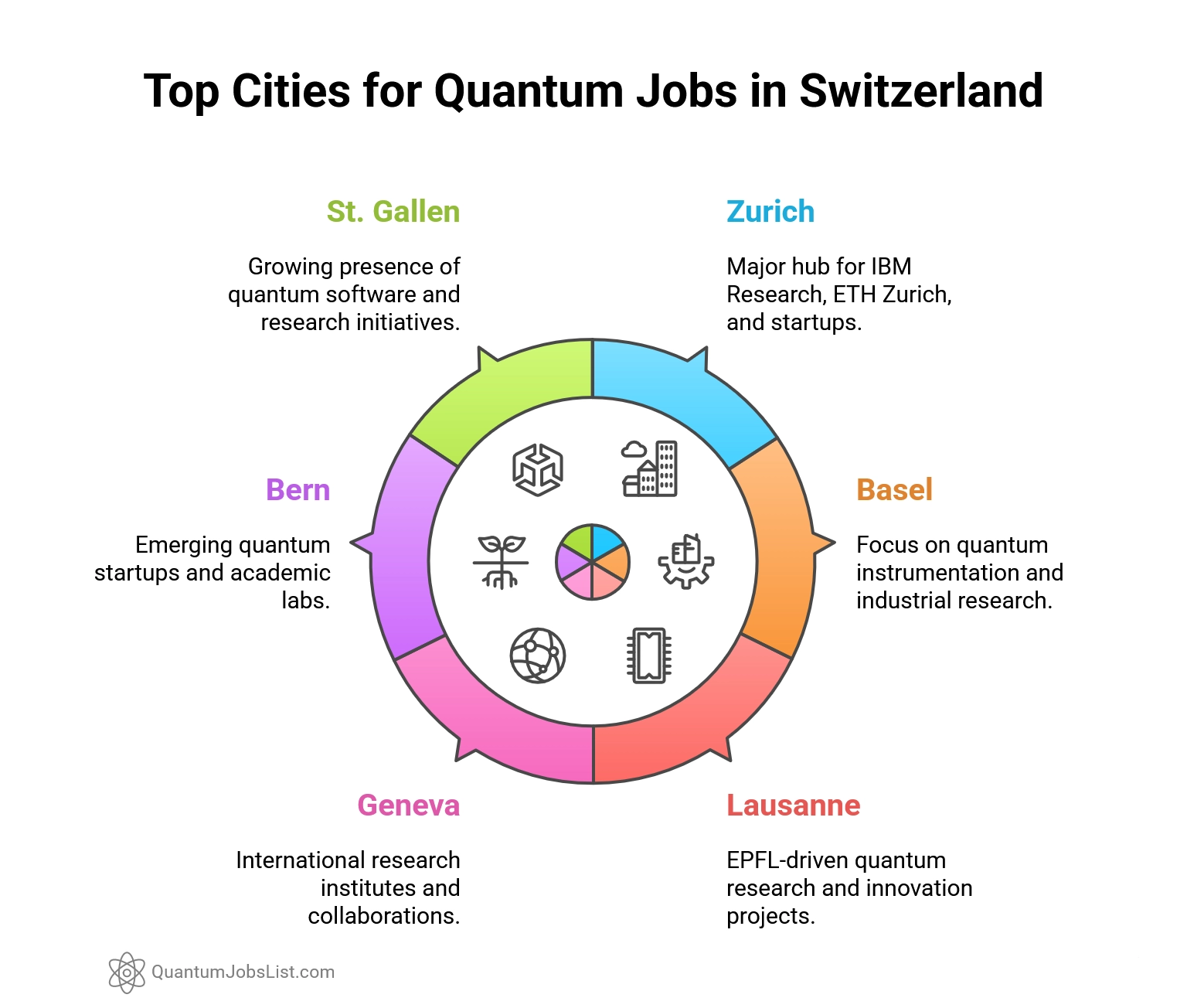Quantum Jobs List
Quantum Computing Jobs Switzerland
The quantum computing job market in Switzerland is growing fast, with strong demand for software, hardware, and research talent. Explore leading employers, key skills and current salary trends.
What Is Quantum Computing?
Quantum computing uses two main ideas: superposition and entanglement. These concepts allow it to perform tasks that regular computers cannot do. With decades of research, cutting-edge companies, and targeted investments, Switzerland has emerged as a global leader in quantum computing, transforming sectors such as cryptography, pharmaceuticals, finance, materials, and secure communication.
Achieving #AQ36 is a significant leap forward, opening new possibilities for applications including logistics, finance, pharmaceuticals, chemistry and Artificial Intelligence. Peter Chapman, CEO of IonQ, on its quantum computer installation in Basel
Why Switzerland Leads in Quantum Excellence?
Switzerland is one of the first countries in the world to develop and implement a quantum strategy, starting over 20 years ago. With a combination of adaptable university systems, innovative private sector players, and supportive government, the Swiss ecosystem stands as the model of how a small country can become a major quantum computing powerhouse.
Since 2001, Switzerland has invested approximately 50 million Swiss francs in each of the four National Centres of Competence in Research (NCCR) in quantum science. Nanoscience in Basel, quantum photonics in Geneva/EPFL, a QSIT in Zurich/Basel/Geneva, and SPIN on scalable qubit systems in Basel/ETH Zurich/IBM/EPFL were the resulting centers. These investments educated generations of quantum scientists and established the leading laboratories that are the basis of Switzerland’s advanced quantum ecosystem.
Switzerland has invested CHF 330 million in quantum research, leading to important publications. Practical applications were established from early commercialization milestones such as ID Quantique’s 2007 deployment of the world’s first commercial quantum cryptography system. At IBM Research-Zurich, Swiss researchers co-developed CRYSTALS-Kyber and Dilithium, which are now NIST-approved post-quantum cryptography standards.
Zurich has a strong startup environment with companies like ID Quantique and Zurich Instruments. It is home to top institutions and offers access to Europe, political stability and unique advantages for Swiss quantum professionals. CERN and other international entities augment the connectivity between Swiss research and the world. For those dynamic professionals in quantum research, Switzerland has few equals.
.webp)
Job Market Outlook in Switzerland
The job market outlook for quantum computing in Switzerland is strong, with steady growth driven by world-class research labs, rising startup activity, and increasing industry demand. New roles are opening in software, hardware, sensing, and quantum-safe security as universities and companies expand their teams.
Current Landscape
Switzerland’s quantum job market, with 11 to 45 positions currently available, is both selective and rewarding. While LinkedIn has around 45 job posts, specialist quantum job boards show between 11 and 25. These positions are in high demand, as they require a high level of specialization and offer excellent wages and conditions.
This area brings together people from both schools and businesses to work together. Staff move fluidly between university labs, research spinoffs, and tech corporations, facilitating research exploitation. ETH Zurich has more than 30 quantum research teams distributed across six departments, creating substantial potential in Zurich.
Global tech leaders IBM Research-Zurich, NVIDIA, IonQ, and Microsoft partnerships widen access to advanced tech.. 13 Swiss quantum startups in software, quantum cryptography, and software offer positions in product development, research, or entrepreneurship in various fields.
Growth Projections and Strategic Direction
The Swiss Quantum Initiative (SQI), launched in 2022 and headed by the Swiss Quantum Commission (SQC) with prominent Swiss quantum specialists, is the main actor of Switzerland’s quantum future. SQI is a testament to Switzerland’s focus on keeping the quantum race with the practical deployment of quantum technologies.
All four of the main universities in the country, ETH Zurich, EPFL, University of Basel, and University of Geneva, host separate quantum centers. These centers integrate research and its outcomes in the industry and public sector to streamline the development of breakthroughs and their commercialization in the ecosystem.
EPFL has hired a dozen new quantum professors since 2020, an indicator of strong institutional support. ETH Zurich’s Quantum Center is a key player in the Zurich region, having 30 research groups across six departments. ETHZ-PSI Quantum Computing Hub, initiated in 2021 with the Paul Scherrer Institute, aims at large-scale quantum computers with superconducting circuits and trapped ions. The Swiss government facilitates the transition from research to application.
“It provides favorable conditions and facilitates the transition from research to actual applications,” says EPFL Professor Thomas Vidick, creating a demand for qualified people with technical and applied skills.
QuantumBasel, founded in 2022, offers commercial quantum computing and AI opportunities in life sciences, manufacturing, and logistics, advancing the potential beyond Zurich and Geneva.
Industry Demand Across Sectors
In Switzerland, multiple industries offer a range of quantum-related opportunities. Major banks in finance, such as UBS and Credit Suisse, are partaking in quantum initiatives geared toward banking and wealth management, as well as trading and risk management with derivative q-portfolio algorithms.
Specialized quantum computing in molecular simulations speeds up the drug discovery process, as well as the development of new materials. This has allowed the Basel Pharmaceutical and Life Sciences sectors to flourish. Quantum Basel is hiring at the intersection of chemistry, biology, and quantum computing.
Demand for quantum sensing and metrology continues in the fields of manufacturing and precision engineering. `Swissphotonics` aids single-photon sources, detectors, and integrated photonic circuits, which are vital for quantum technologies.
International actors like CERN and the ITU propose positions in the intersection of technical quantum skills with global relations and policy.
Swiss academic institutions like ETH Zurich, EPFL, University of Basel, University of Geneva, and PSI are hiring globally on a competitive basis for leadership in quantum technologies with research, postdoc, and PhD positions.
Quantum Computing Jobs Switzerland: Salary Ranges by Role
Quantum computing professionals in Switzerland earn some of the highest salaries in Europe. This is due to the country's high average salaries, a strong demand for quantum talent, and the specialized skills and expertise required in this field. Salaries are in Swiss Francs (CHF). You can expect 1 CHF to be 1.1 USD (some variations in exchange rates exist). You can learn more about Quantum Jobs Salaries here.
Average Salary Overview
Quantum Computing Engineer (Switzerland):- CHF 142,000 average salary a year
- Starting Salary: CHF 73,600
- Median Salary: CHF 129,000
- Maximum Salary: CHF 217,000

Quantum Computing Engineer (Zurich):- CHF 151,000 average salary a year
- Starting Salary: CHF 84,600
- Median Salary: CHF 140,000
- Maximum Salary: CHF 237,000
Quantum Computing Specialist (Zurich):- CHF 172,000 average salary a year
- Starting Salary: CHF 85,900
- Median Salary: CHF 162,000
- Maximum Salary: CHF 270,000
Salary by Education Level
Education significantly impacts quantum computing salaries in Switzerland:-
- Bachelor Degree: CHF 96,700 average
- Master Degree: CHF 112,000 average (+16% vs Bachelor)
- PhD: CHF 139,000 average (+24% vs Master)
- Postdoctoral Experience: CHF 205,000 average (+47% vs PhD)
- Senior Research Position: CHF 230,000 average (+13% vs Postdoc)
Geographic Salary Variations
Zurich (Highest Paying):
- Quantum Computing Engineer: CHF 151,000 average (highest in Switzerland)
- Quantum Computing Specialist: CHF 172,000 average;
- Premium due to concentration of tech companies, ETH Zurich, high cost of living
Basel:
- Quantum Software Engineer: CHF 139,000 average
- Strong pharmaceutical and life sciences quantum applications;
- Slightly lower cost of living than Zurich
Geneva:
- Similar to Basel range (CHF 135,000-145,000 average)
- Quantum cryptography and secure communications focus;
- International organizations (CERN, ITU) provide unique opportunities
Lausanne/Vaud (EPFL):
- Academic positions: CHF 120,000-180,000 range
- Startup equity often supplements base salary;
- Lower cost of living than Zurich
Compensation Considerations
Switzerland's tax system is favorable compared to other European countries; with progressive federal, cantonal and municipal taxes.
Total tax burden varies significantly by canton:
- Zurich: approximately 15-25% effective rate for high earners
- Zug: among Switzerland's lowest-tax cantons;
- Geneva: higher than Zurich but still competitive internationally
- No capital gains tax on stock options (major advantage for startup employees)
Social Insurance Contributions:
- Employer & employee each contribute approximately 6% to social insurance (AHV/AVS);
- Pension fund (2nd pillar) contributions: 7-18% of salary depending on age
- These provide excellent retirement benefits
Additional Benefits:
- 13th Month Salary: Many Swiss employers pay a 13th month bonus (effectively 8.3% salary increase);
- Vacation: 4-6 weeks annual leave standard
- Health Insurance: Employer often contributes to mandatory health insurance premiums
- Stock Options: Startups typically offer 0.1-2% equity for early employees
- Professional Development: CHF 2000-5000 yearly training budgets common;
Salary Growth: Swiss quantum professionals experience approximately 12% salary increase every 15 months on average. This is significantly higher than the national average of 9% across all professions.
Cost of Living Context: Switzerland has a high cost of living; but quantum salaries provide comfortable lifestyles:-
- 1-bedroom apartment in Zurich city center: CHF 2000-2800 a month
- Health insurance: CHF 300-500/month (mandatory);
- 1-bedroom apartment in Basel/Geneva: CHF 1500-2200 a month
- Quantum salaries of CHF 120,000+ provide substantial discretionary income even in expensive cities
Salary data compiled from SalaryExplorer, SalaryExpert, Quantum Jobs List and Swiss quantum employer surveys.
What Skills and Degrees Are Needed for Quantum Jobs in Switzerland?
Key skills for quantum jobs in Switzerland include strong knowledge of quantum computing, physics, mathematics and computer science. Companies look for experience with quantum software tools, algorithms and basic programming. You must have a degrees in physics, engineering, computer science, or related disciplines.
Educational Requirements
Minimum Qualifications: Bachelor's degree in Physics, Computer Science, Electrical Engineering, Mathematics or related field; Strong academic record with relevant coursework in quantum mechanics or computational theory
Preferred Qualifications:
- Master's Degree with coursework in Areas of Physics, Computer Science, Computer Engineering, Electrical Engineering, or related disciplines, with a focus on quantum computing.
- If your job mainly involves conducting research, eligibility generally involves holding a PhD in designing hardware, theoretical computing, algorithms in quantum error correction, or any other area in quantum computing.
- Having postdoctoral experience is a requirement for a principal investigator, senior research scientist, or faculty member.
- Courses that may be of interest: solid-state physics, quantum algorithms, quantum optics & quantum information theory.
What Are the Top Swiss Universities with Leading Quantum Programs?
ETH Zurich (Swiss Federal Institute of Technology Zurich)
Quantum Center at ETH Zurich:
- Since 2020, comprises 30 research groups from six departments
- Links quantum research and teaching across all ETH departments
- Acts as a Zurich-wide contact point for major quantum initiatives
- Physics, Computer Science, Materials Science, Mathematics and Electrical Engineering and Chemistry are the departments involved.
ETHZ-PSI Quantum Computing Hub:
- In May 2021, a collaborative center with the Paul Scherrer Institute was set up.
- Objective: To build large-scale quantum computers that use superconducting circuits and trapped ions.
- Control of PSI's advanced quantum hardware & research facilities.
Research Strengths:
- Quantum computing hardware (superconducting qubits, ion traps)
- Quantum algorithms & computational complexity
- Quantum error correction
- Quantum simulation and quantum many-body physics
École Polytechnique Fédérale de Lausanne (EPFL)
Center for Quantum Science and Engineering (QSE Center):
- Serves as research and teaching hub for all quantum efforts at EPFL.
- Two key focus areas: (1) Applied quantum algorithms and data science, (2) Quantum hardware materials and systems.
NCCR SPIN Participation:
- EPFL is a partner in the National Centre of Competence in Research - SPIN
- Collaboration with University of Basel, IBM Research-Zurich & ETH Zurich
- Focus: Developing reliable, fast, compact, scalable spin qubits in silicon.
Quantum Startups from EPFL:
- Ligentec: Photonic integrated circuits for quantum computing.
- Qanova Tech: Traveling wave parametric amplifiers for quantum devices.
- Miraex: Quantum interconnects for computing/networking systems.
Research Strengths:
- Photonic quantum computing and quantum optics
- Quantum communication & quantum networks
- Quantum materials and devices
- Quantum machine learning
University of Basel
Department of Physics - Quantum Computing Research:
- Solid background in condensed matter theory and quantum computing.
- Experimental quantum physics includes work with trapped ions and superconducting circuits.
- Focused on quantum materials and quantum sensing.
NCCR SPIN Leadership:
- University of Basel heads the National Centre of Competence in Research - SPIN.
- Pioneers the development of scalable spin qubit quantum computers in silicon.
- In close partnership with IBM Research-Zurich, ETH & EPFL.
Research Strengths:
- Spin qubits in silicon & quantum dots
- Quantum transport and mesoscopic physics
- Nitrogen-vacancy centers in diamond
University of Geneva
Geneva Quantum Center:
- Now a historic site for quantum research, especially for quantum cryptography.
- Home to ID Quantique, the FIRST company in the world for quantum cryptography.
Research Strengths:
- Quantum key distribution (QKD) & quantum cryptography
- Quantum random number generation
- Quantum optics and quantum information
- Foundational quantum mechanics
Industry Connections:
- Direct pipeline to ID Quantique (Its now part of IonQ)
- Collaborations with international quantum cryptography projects
- European quantum communication network initiatives
Paul Scherrer Institute (PSI)
While not a university, PSI is Switzerland's largest research institute for natural & engineering sciences and a major quantum employer:
Quantum Research Programs:
- Partner in ETHZ-PSI Quantum Computing Hub
- Quantum sensing & quantum metrology
- Quantum computing hardware development
Employment Opportunities:
- PhD opportunities in the optical and electrical measurement of quantum devices.
- Postdocs in quantum hardware.
- Specialists needed in cryogenics and quantum control.
- Engineering roles for quantum systems.

What are the Top Skills for Quantum Careers in Switzerland?
Technical Skills
To get a quantum computing job in Switzerland, you must have some technical skills focused on combining advanced science knowledge with strong computational and problem solving abilities.
- Quantum Hardware Platforms: Knowledge of superconducting qubits, trapped ions, neutral atoms, photonic systems, spin qubits, and NV centers.
- Classical Computing Foundation: Data structures, algorithms, and theory of computational complexity, and high-performance computing.
- Advanced Mathematics: Linear algebra, including vector spaces, eigenvalues and tensor products, complex analysis, group theory, and functional analysis.
- Quantum Algorithms: Algorithms such as Shor’s and Grover’s, VQE, QAOA, algorithms in quantum machine learning, and methods for quantum simulation.
Hardware and Experimental Skills
Hardware and systems skills for quantum jobs focus on understanding quantum devices, experimental setups and system-level integration. These all are required for a reliable performance.
- Quantum Hardware Platforms: Knowledge of superconducting qubits, trapped ions, neutral atoms, photonic systems, spin qubits and NV centers.
- Instrumentation and Control: Quantum control and measurement systems and signal processing, along with FPGA programming.
- Experimental Physics: Cryogenics, vacuum systems, laser systems, microwave engineering and optics (in particular, appreciated by the Swiss experimental quantum community).
- Quantum Error Correction: Fault-tolerant quantum computing, error correction codes and noise mitigation, along with quantum control theory.
Applied and Soft Skills
Applied skills for jobs involve: Theory in real-world projects, testing solutions & improving quantum technologies through hands-on experience.
- Interdisciplinary Application: Ability to apply quantum computing to real problems in chemistry, finance, optimization, machine learning, cryptography.
Language Skills for Switzerland
Most Swiss quantum professionals are multilingual; English proficiency is sufficient for technical roles.
- English: Essential for all quantum positions (working language in research and tech)
- German: Highly advantageous for Zurich, Basel & German-speaking Switzerland
- Italian: Occasionally useful in Ticino and southern Switzerland.
- French: Useful for Geneva, Lausanne/EPFL and French-speaking Switzerland
In-Demand Specializations in Swiss Quantum Market
Quantum Cryptography and Post-Quantum Security
Swiss quantum cryptography is world-leading, thanks to ID Quantique and Swiss contributions to the cryptography standards of the post-quantum future. If this interests you, some of the available positions involve the construction of systems for quantum key distribution, quantum secure encryption, quantum secure communication (networks), quantum random number generators, and quantum safe communication.
Quantum Control Electronics and Instrumentation
Rohde & Schwarz bought Zurich Instruments in 2021. This deal shows how Switzerland excels in quantum control systems. You can contribute to the development of control electronics for quantum systems, measuring control instruments, arbitrary waveform generators, or quantum analyzers (all are used to control qubits).
Photonic Quantum Computing
Demand for expertise in photonics generated by EPFL and startups such as Ligentec and Miraex is considerable. Careers in this area focus on the development of photonic integrated circuits, quantum interconnects, single-photon sources and detectors, or photonic quantum processors.
Quantum Sensing and Metrology
Switzerland's tradition of precision engineering is carried forward with quantum sensing. Companies like Qnami and Basel Precision Instruments are offering positions in quantum sensors, atomic magnetometry, quantum-enhanced imaging, and measuring with unprecedented accuracy.
Spin Qubit Technology
The NCCR SPIN program is paving the way for diversified employment in quantum dots, quantum spin computing, quantum device fabrication, qubit architecture, and scalable quantum systems. If you're interested in working with the future of quantum computing hardware, this program is for you.
Quantum-Classical Hybrid Algorithms
Terra Quantum is paving the way for individuals to create hybrid quantum-classical systems. You will be able to focus on the development of practical algorithms for quantum and classical computing, as well as quantum-inspired classical algorithms and applications for near-term quantum systems.
What Companies Hiring for Quantum Computing Jobs in Switzerland?
Switzerland’s quantum sector is growing rapidly, creating opportunities across research, software, hardware and quantum sensing. Roles are available in startups, established tech firms and university spin-offs. These are making swiss an exciting market for quantum professionals.
Major Swiss Quantum Companies
ID Quantique (Geneva)
ID Quantique, founded in 2001 as a spin-off of the University of Geneva, is the world’s first company to specialize in quantum cryptography. IonQ, a US company that is set to acquire ID Quantique in an all-stock transaction with SK Telecom by the end of 2024 or early 2025, signed a Memorandum of Understanding in 2024.
What They Do:
- Quantum Key Distribution (QKD) Systems for Operational Security Communications.
- World leader integrators in quantum-safe security solutions
- Quantum Random Number Generators (QRNG)
- Ongoing recruitment for PhD, post doc, research engineer, and other technical support positions.
- Single Photon Detection Systems.
Notable Projects:
- First Secured State Elections in Geneva with QKD (2007).
- 800 km quantum network in South Korea with SK Telecom.
- First Quantum-Safe Network in Singapore.
- QRNG Chip embedded in Vsmart Aris 5G smartphone.
Hiring Focus:
- Quantum communication engineers.
- Developers with software for quantum-safe systems.
- Security engineers with quantum skills.
- Quantum network architects.
Zurich Instruments (Zurich)
Spin-off from ETH Zurich, acquired by Rohde & Schwarz in 2021. Technology leader in advanced test and measurement instruments & control electronics for quantum computing.
What They Do:
- Control Systems for Quantum (microwave generators, arbitrary waveform generators)
- Equipment that has been used ranges from superconducting quantum computers to ion-trap quantum computers.
- LabOne Q is a software for quantum computing control.
- Control Electronics for Quantum Experiments Worldwide.
Global Impact: Equipment is used in quantum labs from US to Japan, enabling quantum computing research at major institutions and companies worldwide.
Hiring Focus:
- Software engineers for quantum computing control (80-100% of positions).
- Verification of Quantum Systems.
- Product managers of instruments for quantum.
- Quantum application engineers.
Terra Quantum (St. Gallen/Munich)
Co-headquartered in St. Gallen, Switzerland and Munich, Germany. Develops hybrid quantum-classical algorithms & offers "Quantum-as-a-Service" solutions.
What They Do:
- Applications Of Quantum Computing For Enterprise Customers
- Development Of Hybrid Quantum-Classical Algorithms
- Integration Of Quantum Computing With Machine Learning And Other AI Technologies.
- Research Of Quantum Cryptography.
Service Offering:
- Access To Quantum Computing Resources Through The Cloud
- Generation Of Business Problem-Specific Algorithms.
- Quantum Consulting And Deployment
- Offering Educational And Training Solutions.
Hiring Focus:
- Quantum-Savvy Engineers For AI And Machine Learning
- Developers Of Quantum Algorithms
- Senior Software Engineers (Large-Scale, Data-Centric Systems)
- Scientific Computing Solutions Architects
QuantumBasel (Basel/Arlesheim)
Switzerland's first commercial quantum computing and AI hub, established in 2022. Part of uptownBasel Group, located in Switzerland Innovation Park.
What They Do:
- Access To The Best Quantum Computers.
- Supervised Machine Learning And AI For Quantum Computing And HPC.
- Target Sectors Are: Life Sciences, Industrial Manufacturing, And Logistics.
- Joint Research Activities With Qac.
Hiring Focus:
- AI and quantum integration engineers
- Training & education specialists
- Quantum application developers
- LLM fine-tuning and Business specialists

Swiss University Quantum Research Groups
ETH Zurich - Quantum Center
Research Areas:
- Around 30 Research Groups Split Across Six Departments
- Superconducting Quantum Computing
- Ion Trap Quantum Devices
- Quantum Simulation & Many Body Physics
- Quantum Optics And Photonics
- Quantum Algorithms And Theory Of Complexity
Employment Opportunities:
- PhD Positions Are Available (Annual Salary Of CHF 47,000-65,000);
- Postdoctoral Fellowships Of CHF 75,000-95,000
- Research Scientist Positions For CHF 120,000-180,000
- Quantum Labs Technical Specialist Positions
IBM (Amsterdam):
- Quantum computing research & development
- Collaboration with Swiss universities & research institutes
- Qiskit ecosystem support
EPFL - Center for Quantum Science and Engineering
Research Areas:
- Photonic quantum computing
- Quantum sensing
- Quantum materials and devices
- Quantum machine learning
Employment Opportunities:
- Startup opportunities through EPFL Innovation Park
- PhD programs with full funding
- Postdoctoral positions across multiple labs
- Engineering positions in quantum labs
International Companies with Swiss Quantum Operations
IBM Research - Zurich (Rüschlikon)
What They Do:
- Quantum computing research and development
- Contributed to CRYSTALS-Kyber and CRYSTALS-Dilithium (post-quantum cryptography standards);
- Partner in NCCR SPIN program
- Quantum hardware & software development
Hiring Focus:
- Quantum research scientists (CHF 135,000-175,000 range)
- Quantum hardware engineers;
- Quantum algorithm developers
- Post-quantum cryptography specialists
NVIDIA (Zurich)
What They Do:
- Quantum computing acceleration on GPUs
- Developer technology for quantum workloads
- Quantum-classical hybrid computing
- Quantum simulation on classical hardware
Hiring Focus:
- Developer Technology Engineers for quantum computing (CHF 100,000-140,000 for 8-10 years experience)
- Senior quantum algorithm engineers;
- Quantum algorithm optimization specialists
- CUDA/GPU programming for quantum applications
IonQ (Through ID Quantique Acquisition)
What They Do:
- Trapped-ion quantum computers
- Cloud-based quantum computing access
- Quantum networking infrastructure;
- Quantum-safe security (through ID Quantique)
Hiring Focus:
- Principal Solutions Architects for Healthcare & Life Science (Basel)
- Quantum communication engineers
- Jobs for business development for European markets
- Optical engineers for trapped-ion systems
Emerging Swiss Quantum Startups & Scale-ups
Qnami (Basel):
Builds quantum sensing tools using NV centers in diamond, offering scanning NV microscopes for atomic-scale magnetic imaging, with roles for quantum physicists, optical engineers & software developers.
Ligentec (Lausanne):
Develops photonic integrated circuits for major quantum computing companies, using low-loss silicon nitride waveguides & hires photonics engineers, process engineers and applications scientists.
Miraex (Lausanne):
Creates quantum interconnects and photonic sensors for quantum networks, based on advanced photonic integration, with openings for optical engineers & quantum communication specialists.
Qanova Tech (Lausanne):
Produces traveling wave parametric amplifiers for reading out quantum devices, serving the quantum hardware market, and hiring RF engineers, quantum hardware experts & physicists.
Swiss Quantum Ecosystem Players
Swiss Photonic Integration Center – Swiss PIC (Villigen):
Based at the Switzerland Innovation Park next to PSI, providing engineering, packaging and photonic integration services for industrial quantum photonics.
CERN Quantum Technology Initiative (Geneva):
Advances quantum technologies for particle physics through global collaborations, training programs, and work on quantum sensors and quantum computing for high-energy science.
CSEM (Swiss Center for Electronics and Microtechnology):
Operates across several Swiss locations, focusing on quantum photonics fabrication, cryogenic electronics, and applied quantum technology research.
Best Cities for Quantum Computing Jobs in Switzerland
The top cities for quantum computing jobs in Switzerland are Zurich, Basel and Lausanne. These cities host major research institutions, leading quantum companies and innovation centers. These features are making them ideal for careers in quantum research, development, and engineering.
1. Zurich - Switzerland's Quantum Capital
Why Choose Zurich for Quantum Careers
Zurich boasts leading academic research and the best commercial ecosystem in Switzerland, establishing it as the country’s foremost quantum hub. In the city, ETH Zurich leads most academic work. The Quantum Center there manages 30 research groups across six different departments. The most recent addition, the ETHZ-PSI Quantum Computing Hub, opened in 2021, and lets staff access large-scale quantum computers and the Paul Scherrer Institute's advanced resources.
On the commercial side, things are just as good. Zurich Instruments' Rohde & Schwarz deal with building quantum control systems. IBM Research-Zurich works on quantum computing as well as standards on post-quantum cryptography. NVIDIA aims at the optimization of quantum algorithms as well as hybrid quantum-classical computing. Each of them has positions in research, hardware, and software, or applied quantum.
Zurich is also the highest paying. Salaries are at CHF 151,000 and CHF 172,000 for quantum engineers and quantum specialists, respectively. The amounts allow for a comfortable lifestyle despite the high living costs. Expect German in addition to English in the workplace. The city has top-class transport, a rich cultural life, and beautiful nature, making it perfect for the best careers in quantum computing.
2. Basel - Quantum Computing for Life Sciences
Why Choose Basel for Quantum Careers
Basel is in a great location for quantum professionals. It combines quantum computing with a strong pharmaceutical and life sciences industry. Roche and Novartis's contributions to quantum computing for drug discovery and molecular modeling bring about careers in quantum chemistry, molecular simulation, and computational biology.
The University of Basel blends the NCCR SPIN program for large-scale spin qubit quantum computers in silicon. This began in 2020, connecting Basel to ETH Zurich, EPFL, and IBM research in Zurich to address issues of compact and trustworthy spin qubit systems. Professionals are getting involved in top-notch Swiss projects that have exciting opportunities for quantum hardware!
QuantumBasel, the first of its kind entrepreneurial hub in Switzerland for quantum computing and AI, focuses on life sciences, industrial manufacturing, and logistics. It offers a unique access to quantum and high-performance computing, seamlessly integrating advanced computing with an industrial context.
Currently, quantum software engineers make around 139,000 CHF. Basel provides lower living expenses, shorter commute and more cultural diversity, making the city an attractive option for specialists in quantum chemistry, life sciences, or spin qubits.
3. Lausanne/Vaud - EPFL's Photonic Quantum Hub
Why Choose Lausanne for Quantum Careers
Lausanne is also where the Vaud canton is located. Here is the EPFL, an École Polytechnique Fédérale, one of the best Engineering schools in Europe. Within the EPFL is the Center for Quantum Science and Engineering, one of the most active research centers in Europe in the fields of quantum communication and quantum materials, and quantum photonic computing. Since 2020, the university has taken on its 1st batch of new hire quantum professors, comprising 12 in total, allowing for the research group's expansion and capability enhancement.
Lausanne is the leading Swiss city for collaboration between research and startups. In EPFL’s Innovation Park, Ligentec, Miraex, and Qanova Tech were also incubated, which allowed quantum professionals to transition into research commercialisation. In a startup, one can also acquire equity, thus benefiting from the growth of the company.
Terra Quantum is based in Munich and also has a branch in St. Gallen, Switzerland. The company partners with Lausanne. They focus on hybrid quantum-classical algorithms and “Quantum-as-a-Service”.
Lausanne is preferred compared to Zurich due to its low cost of living, beautiful scenery over Lake Geneva, its French-speaking culture, and convenient access to skiing. In the Lausanne region, Academic salaries range from CHF 120,000 to 180,000, and with the possible equity from a startup, the region becomes ideal for careers in photonics, quantum communications, or even entrepreneurship.
4. Geneva - Quantum Cryptography Pioneer
Why Choose Geneva for Quantum Careers
Geneva is the origin of commercial quantum cryptography. Thanks to research from the University of Geneva, ID Quantique was born in 2001. In 2007, it released the first commercial quantum key distribution system. As a result, Geneva became a center of quantum cryptography, quantum communication, and quantum-safe security.
IonQ, a US company, has made ID Quantique its flagship. They protect the world’s vital communication, and offer quantum technologies to practitioners, and allow the development of real-world impactful technologies.
Being international, as in the case of CERN’s Quantum Technology Initiative and the ITU, Geneva offers a policy development and technical work combo. The role they are offering involves creating standards and policies to make a global impact.
As Genevan universities offer salaries of CHF85,000–160,000, they maintain their status as research pioneers. The average salary for quantum roles is between 135,000 and 145,000 CHF. This income allows for a decent lifestyle, even with the high cost of living. Housing options include 1-bedroom apartments that range from 1,800 to 2,500 CHF. You can work in cryptography, communication, and policy in a cosmopolitan environment in Geneva.
5. Other Swiss Quantum Locations
Rüschlikon, near Zurich, is home to IBM Research Zurich. One of IBM’s leading global labs. It offers a premium research setting on the Lake Zurich waterfront & is known for work in post-quantum cryptography. The area provides a quiet suburban environment with easy access to Zurich.
Villigen hosts the Paul Scherrer Institute. The largest research institute in Switzerland. It is a center for cryogenic systems & quantum control research and partners closely with the ETHZ-PSI Quantum Computing Hub. The site includes advanced facilities for quantum hardware development.
St. Gallen is the headquarters of Terra Quantum and offers a growing base for quantum software & algorithm development. The city provides a lower cost of living compared to Zurich or Lausanne, and maintains strong links to the Munich quantum ecosystem.

How to Land a Quantum Job in Switzerland?
Landing a quantum job in Switzerland starts with building strong skills in physics, computer science, or engineering. You must focus on hands-on projects, research experience and familiarity with common quantum tools. Connecting with Swiss labs, startups and industry events can also help you.
Step 1: Build Your Quantum Foundation
To build a career in Switzerland's quantum industry, you need to gain the right technical skills and understand the Swiss job market and academic environment. Top-tier employers in the field want to see experience from premier schools. For most positions in the industry, a Master’s is the bare minimum, while most research roles will ask for a PhD.
If you are a student, you should consider quantum programs in Switzerland. ETH Zurich, University of Basel, University of Geneva, and EPFL have fully funded PhD programs, and offer a starting salary of CHF 47,000–55,000, which increases to CHF 55,000 - 65,000. The quantum programs take 4–5 years and offer training and connections to the Swiss quantum ecosystem, as well as publication opportunities. International students are welcome, and the research teams are usually multinational, comprising Europe, North America, and Asia.
Practical quantum experience should be the focus for the graduates. You should publish, work on projects, participate in hackathons, and contribute to quantum systems like Qiskit, Cirq, or PennyLane. Applications to positions will also be stronger if you have Python skills and experience with simulations in hardware control systems. Zurich Instruments is a company that looks to employ someone who knows the challenges of quantum hardware and can build and control it.
Step 2: Gain Practical Experience and Build Network
Switzerland’s small quantum climate allows for adaptable networking and collaboration, boosted by its diverse job market. Go to conferences and workshops, for example, those run by ETH Zurich’s Quantum Center and EPFL’s QSE Center, and those quantum seminars organized by the Swiss Physical Society. You can meet employers and get to know active researchers to gauge the ecosystem’s future direction.
Think about some short research visits or internships. Many groups are open to Master’s students or visiting researchers. Spending the summer or a semester within a Swiss quantum lab can offer a rich experience and open doors for further employment, or PhD opportunities, as it is highly valued by employers. Inquiries to professors are often welcomed, and there are formal opportunities at ETH Zurich and EPFL.
Research should be published, and it is good to target high-impact visibility, like with Physical Review Letters, Nature Physics, QIP and the other quantum journals – and it will also help co-author collaboration with Swiss researchers.
If you are interested in the cross-section between quantum computing and business, then you can also engage with start-ups. Internships and entry-level roles at Ligentec, Miraex, and Qnami provide the development and experience expected by early-career quantum professionals.
Step 3: Understand Swiss Work Culture and Immigration
Switzerland’s work culture will affect how you grow in your quantum career. Applications must be complete, polished, and properly formatted, with no visible errors, as precision, reliability, and thoroughness are highly valued. Cover letters need to be customized in order to demonstrate understanding of the company or research group.
Swiss institutions are supportive of work-life balance. Research may be challenging and demanding, but organizations will respect your off-time, your vacations (4–6 weeks) and your plans for a sustainable schedule, preserving you for the longevity of the career without burnout.
Depending on the region, the language can vary. English is a dominant language so building a full quantum career without learning a local tongue is possible. However, for integration and more opportunities, it is advisable to learn some basic German (Zurich, Basel) or French (Geneva, Lausanne) as this will greatly help you for government or industry work. Many local professionals will learn the language on the job, this effort is appreciated.
Step 4: Know Swiss Immigration and Work Permits
For EU/EFTA citizens, You can easily migrate to Switzerland because of the freedom of movement. You can enter to seek work for 90 days, and once employed, a Permit B residence permit (valid five years, renewable) is easily arranged by your employer. You can apply for permanent settlement with a Permit C after 10 years.
For non-EU/EFTA citizens, work permits are more complex but feasible for quantum professionals. There are limited permits issued annually and highly skilled quantum experts are prioritized. Employers must show the role needs specialized skills not available in Switzerland or the EU - quantum expertise easily qualifies.
Types of Work Permits:
- L Permit (Short-term): For contracts up to 1 year, renewable up to 2 years total
- B Permit (Residence): For contracts longer than 1 year, valid 1-5 years, renewable
- C Permit (Permanent Settlement): After 5-10 years continuous residence (varies by nationality)
Path to Permanent Residence: Most non-EU quantum professionals start on B permits, renewed while employed. After 5 years for US/Canadian citizens or 10 years for others; you can apply for a C permanent settlement permit, allowing unrestricted living & working in Switzerland.
PhD & Postdoc Pathway: Many enter via PhD or postdoc roles, which receive favorable immigration treatment. Student permits allow research work & after a PhD, you have 6 months to find employment. Often leading to postdocs, industry or startups while building Swiss networks.
Step 5: Apply Strategically to Swiss Quantum Positions
- Job searching resources include university career pages, individual company career pages, niche job boards such as Quantum Jobs List, and academic networks.
- You will need to include a cover letter with your CV to apply for jobs in the Swiss quantum sector.
- CV: An academic CV with your details, publications, presentations, technical skills, and programming languages
- Cover Letter: Include a tailored letter explaining your background and how you will fit into the specific job.
- References: Include the names of your 2-3 references and say they will be available to be contacted if needed.
- Research Statement: Usually required for academic jobs to consolidate the direction of your research into
Salary Negotiation: In the Swiss industry, quantum salaries are usually flexible, especially if you're working in academia. Academic salaries are usually at fixed scales, while industry salaries are usually at much higher scales. Research the normal salaries for your area and level of experience. PhD holders from elite institutions or those with a reputable record can negotiate higher.
Suggested Read: Quantum Jobs and Salaries
Professional Development Resources
Professional development for quantum jobs in Switzerland includes: Online courses, university programs and industry workshops. These help professionals build practical skills and stay current with new quantum technologies.
Online Learning Platforms
IBM Quantum Learning:
- Free Qiskit tutorials & documentation
- Hands-on quantum programming experience
Microsoft Learn:
- Azure Quantum documentation & tutorials
- Q# programming language courses
QuantumBasel QuTalent Platform:
- Free online training developed by Swiss quantum experts
- Self-paced courses covering quantum fundamentals through advanced topics.
- Topic-focused videos taught by leading researchers.
Xanadu Quantum Codebook:
- Free interactive quantum computing tutorials
- Focus on PennyLane and quantum machine learning
EPFL Extension School:
- Professional courses in quantum technologies
- Developed by EPFL faculty
- Focus on practical applications
Professional Certifications
University Certificates:
- ETH Zurich continuing education programs
- EPFL professional development courses
- Custom corporate training programs
Industry Certifications:
- IBM Certified Associate Developer certificate for Quantum Computation by using Qiskit.
- AWS Quantum Solutions Architect certificate for the Amazon's Braket.
- Microsoft Azure Quantum Developer Certification.
Quantum Books
- "Quantum Computing: An Applied Approach", by Jack Hidary
- "Dancing with Qubits" by Robert Sutor
- "Quantum Computing: A Gentle Introduction" by Rieffel & Polak
Conferences and Events
- Swiss Quantum Events: ETH Quantum Center symposia and workshops, EPFL QSE Center seminars and colloquia, Swiss Physical Society Quantum Sections meetings, Basel Quantum meetups & QuantumBasel events.
- Major International Conferences: QIP, QCrypt, APS March Meeting, IEEE Quantum Week.
- European Quantum Conferences: European Quantum Technologies Conference, Q2B Europe, Munich Quantum Valley events.
Career Tips from Quantum Jobs List
Quantum Jobs List helps students and professionals see career paths in Switzerland's growing quantum ambition. The platform connects users with job openings and learning resources. For more, You can have a look at our Blog.
Quantum Jobs in Switzerland
For More, Please visit Quantum Jobs in Switzerland
FAQs
Here are a few common questions people ask about quantum careers in Switzerland. These are covering topics like needed skills, education paths, top employers and future growth.
What are the top quantum research areas in Switzerland?
Switzerland is the best in quantum sensing, photonic quantum computing, control systems, quantum cryptography, and superconducting qubits. Getting into the field with Switzerland means working at the wonderful ID Quantique, IBM Zurich, EPFL, Qnami, and various other modernized labs.
What are the main quantum companies in Switzerland?
The best Swiss quantum companies are ID Quantique, Zurich Instruments, Terra Quantum, and QuantumBasel. Fast-growing startups include Qnami, Ligentec, and Miraex. You will also find Swiss Work of international companies such as NVIDIA, IBM, and IonQ.
Is Switzerland’s cost of living too high for quantum salaries?
Switzerland is expensive, but quantum salaries usually cover it well. A quantum engineer earning CHF 140000–170000 can pay for rent, living costs, insurance and still save money. Taxes are relatively low and the country offers safety, healthcare, and excellent services.
Are there entry-level quantum jobs in Switzerland?
Sure, but there’s a lot of competition. You can apply to PhD positions, postdocs, junior Software Engineer, and lab assistant positions. The more academic and real-world credentials you have, the better and quicker you can secure a position, and most people start with a PhD before moving onto industry jobs.
Can I start a quantum company in Switzerland?
Yes, it has a lot of quantum startups. Switzerland offers good IP protection, quick company registration, university backing, government subsidies, and VC. The main challenges are high costs and work permits for non-EU founders, but there are plenty of opportunities.
How international is Switzerland’s quantum community?
Switzerland hosts diverse nationalities in the quantum field, with research groups composed of members from Europe, North America, and Asia. Institutions like ETH Zurich and EPFL attract students and researchers from around 100 nationalities, facilitating international collaboration and communication.
What kind of quantum computing opportunities can I find in Switzerland?
Research positions available in the ETH Zurich, EPFL, University of Basel, ID Quantique, Zurich Instruments, and new startups in the region allow you to acquire and hone your skills in a favorable environment, as high-level quantum technology is abundant.
Which Swiss city is best for quantum computing jobs?
Zurich leads in jobs and research in the region, while Basel focuses on Life Sciences and spin qubits. Lausanne (EPFL) excels in Photonics and has many successful startups. Geneva specializes in quantum cryptography with ID Quantique. Choose based on your specialization.
Start Your Quantum Computing Career in Switzerland Today
Switzerland offers quantum technology opportunities for professionals seeking a high quality of life. Years of strong research leadership, along with top universities focused on quantum studies and innovative companies creating the first commercial quantum systems, lay the perfect foundation for a career in quantum technology. This area offers endless possibilities for growth and development.
The field combines academic excellence and entrepreneurship, theoretical and applied research, and technical complexity, along with a favorable lifestyle. There is a space for contribution, growth, and expansion for PhD students, seasoned professionals, and entrepreneurs in the sector.
Salaries in the field of quantum are amongst the highest in Switzerland. Along with favorable taxes, political stability, and top-tier healthcare, a multilingual environment and breathtaking nature create a sustainable environment for quantum careers to flourish.
This extended partnership with D-Wave solidifies our shared dedication to quantum innovation in Switzerland and beyond. Damir Bogdan, CEO of QuantumBasel, on their collaboration with D-Wave
Next Steps
- Research Swiss Quantum Institutions: Look into ETH Zurich, EPFL, University of Basel, and University of Geneva for their quantum programs.
- Connect with Specialists: Use LinkedIn to network with Swiss researchers and engineers in quantum fields.
- Assess Your Profile: Evaluate your current skills against job requirements in Switzerland & identify any gaps.
- Enhance Your Skillset: Participate in open-source quantum projects, contribute to research, and develop quantum applications.
- Target Your Applications: Focus on positions aligned with your interests in hardware, software, algorithms or research.
- Know Swiss Work Permits: Familiarize yourself with immigration processes relevant to your nationality & potential employers.
Long-Term Outlook: Quantum Computing in Switzerland
Strategic Vision and Sustained Commitment
The Swiss Quantum Initiative, which is managed by the Swiss Quantum Commission, oversees quantum developments in Switzerland. Switzerland has consistently invested in research over the last 20 years through four NCCR funding programs, totaling 330 million CHF.
Other countries receive varying amounts of funding, but Switzerland has shown strong commitment. Such stability ensures quantum specialists that funding to support further technological maturation of quantum technologies from the lab to the marketplace will continue.
As SQI experts note, the government’s intent is, “to act as an enabler, creating favorable conditions and supporting the transition from research to real-world applications.” Such support of "translation" fosters not only more research, but also more commercialization opportunities, collaborative partnerships with industry, new start ups, and roles in practical applied quantum technology.
Emerging Application Areas and Market Opportunities
Quantum-Safe Security and Cryptography
Switzerland excels in Quantum-Safe Security and Cryptography. These areas are the strongest parts of Switzerland’s work in quantum technology. As quantum computing advances, current encryption methods will become vulnerable, increasing the urgency for post-quantum cryptography, especially for governments, banks, and critical infrastructure.
Swiss leadership is based on a singular expertise in quantum cryptography (ID Quantique) and post-quantum cryptographic algorithms (CRYSTALS in IBM Research-Zurich). The early adoption of quantum-secure infrastructures in the financial sector fosters leadership in safe cryptography.
Life Sciences and Pharmaceuticals
This offer strong growth, especially in Basel. Companies like Roche & Novartis explore quantum computing for drug discovery, molecular modeling, and personalized medicine. QuantumBasel focuses on life sciences, creating roles for professionals bridging quantum chemistry and biology.
Quantum Sensing and Metrology
This aligns with Swiss precision engineering. Qnami’s sensors enable atomic-scale imaging for materials, biological applications and navigation.
Financial Services Optimization
This benefits from quantum algorithms for portfolios, risk modeling & fraud detection, making Zurich a hub for applied quantum finance.
Investment Trends and Ecosystem Growth
Investors are confident because Swiss Quantum startups have had successful exits. Swiss Quantum Companies like Zurich Instruments, acquired by Rohde & Schwarz (2021), and IonQ acquiring ID Quantique (2024) show that Swiss Quantum Companies can attract global consumers. Experienced founders strengthen the startup ecosystem by investing as angels or advisors.
Forget about Quantum. Startups like Ligentec, Miraex, and Qanova Tech have successfully transitioned from research to commercial ventures thanks to EPFL Innovation Park and ETH transfer programs. These programs fill the gaps so much so that for quantum professionals, Switzerland is a playground for building entrepreneurial and successful ventures.
Corporate investment is rising, with Swiss Quantum Pharmaceuticals and companies in Finance, Manufacturing, and Tech launching Quantum Research Programs. These Research programs open up additional positions for professionals who wish to apply their quantum skills to industry problems.
Talent Development and Workforce Pipeline
Since 2020, EPFL has hired a dozen new quantum professors, clearly indicative of the academic institution’s growing commitment towards nurturing quantum talent. ETH Zurich, EPFL, University of Basel, University of Geneva, and Major National Centres of Competence in Research, offer integrated learning opportunities in quantum science and technology, and graduate, post-doctorate, and academic positions. Such centers foster collaboration across departments, promote interdisciplinary approaches, and broaden awareness of quantum topics.
To promote graduate employability, the Swiss Quantum Initiative combines quantum internships, applied projects, and collaborations with industry for the quantum programs.
Switzerland is a leader in quantum research, with 89% of its research projects done in partnership with others around the world. This gives students a chance to build a global network. Students' networking increases in value when allied to opportunities in Swiss enterprises and beyond.
Future Job Growth Projections
- Conservative growth: workforce rises from 500–700 to 1,000–1,500 by 2030, adding 500–800 new roles
- Optimistic growth: workforce reaches 2,000–2,500 by 2030, adding 1,500–2,000 new roles
- Growth drivers: national funding, strong research, rising startup activity and corporate adoption
- House of Quantum offers shared workspace and collaboration for quantum companies.
- Fastest-growing areas: quantum software, quantum chemistry and life sciences, quantum-safe security, quantum sensing and hardware engineering
This guide is regularly updated to reflect the latest developments in the Switzerland's quantum computing job market.







.svg)

